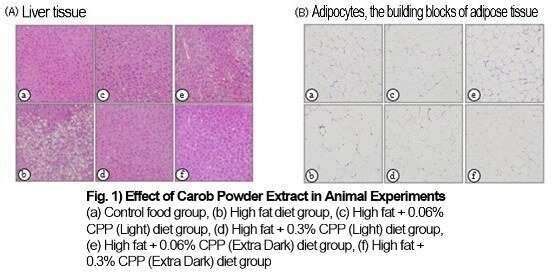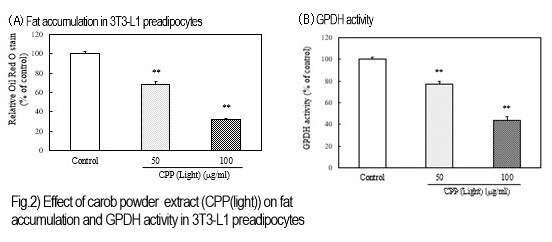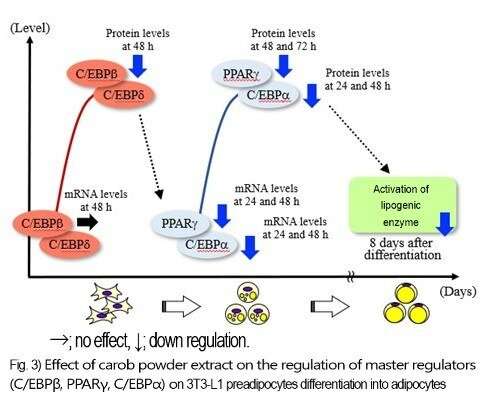Credit: Osaka City University
Associate Professor Akiko Kojima, Graduate School of Human Life Science, Osaka City University, and collaborators have clarified that carob powder extract, which is used as an alternative to cocoa and coffee powder, has anti-obesity effects at the cellular and animal levels.
The accumulation of visceral fat is known to induce diabetes, dyslipidemia, hypertension, and other diseases, leading to arteriosclerosis and serious diseases such as myocardial and cerebral infarction. In this study, the research team aimed to discover a new method to prevent obesity by studying the anti-obesity effect of carob powder extract and its underlying mechanism.
In an experiment using obese model mice, the weight of mice fed a high-fat diet for 52 days increased significantly, while the weight and visceral fat weight of mice fed a similar diet partnered with carob powder extract decreased significantly. Furthermore, fatty liver was suppressed and the size of adipocytes (fat cells), which make up fatty tissue, was significantly reduced (Fig. 1).
To clarify the anti-obesity mechanism of carob powder extract, the team studied 3T3-L1 preadipocytes and found that carob powder extract significantly reduced intracellular fat accumulation by inhibiting glycerol 3-phosphate dehydrogenase (GPDH) activity—the rate-limiting enzyme for fat synthesis. This indicates that carob powder extract inhibits the differentiation of 3T3-L1 preadipocytes into adipocytes (Fig. 2).
-
Credit: Osaka City University
-
Credit: Osaka City University
To further elucidate this mechanism, the team measured the expression levels of the transcription factors C/EBPβ, PPARγ, and C/EBPα, which are master regulators of 3T3-L1 preadipocyte differentiation into adipocytes, at the gene and protein levels. Carob powder extract had no effect on the change in the expression of the C/EBPβ gene, which is expressed immediately after differentiation, while it significantly reduced the amount of C/EBPβ protein. Furthermore, PPARγ and C/EBPα, which are induced by C/EBPβ protein, were both reduced in gene and protein levels by carob powder extract, indicating that a decrease in GPDH activity was induced (Fig. 3).
These results indicate that the anti-obesity effect of carob powder extract is based on the regulation of fat synthesis by controlling the amount of post-transcriptional C/EBPβ protein.
Carob powder has been used as a substitute for cocoa and coffee powder. Based on the new physiological effects found through this study, carob powder is expected to be developed into a food product that can help prevent lifestyle-related diseases. Furthermore, it is expected to lead to the development of research on the transcription factor cascade in adipocyte differentiation.
More information: Kasumi Fujita et al. Carob pod polyphenols suppress the differentiation of adipocytes through posttranscriptional regulation of C/EBPβ, PLOS ONE (2021). DOI: 10.1371/journal.pone.0248073
Journal information: PLoS ONE
Provided by Osaka City University

























